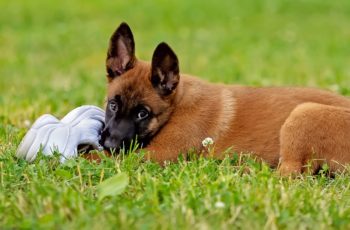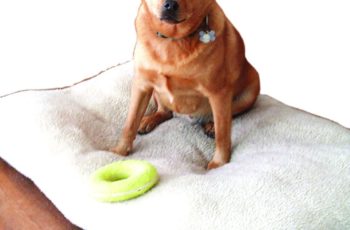There are three poodle varieties, including the standard, which the largest, the miniature, which is mid-sized, and the Toy Poodle, which is the smallest of the three.
Standing no more than 10 inches, the Toy Poodle’s size may be diminutive compared to the other varieties; however, despite his small stature, this breed stands tall. Underneath the curly coat of low-allergen hair, there’s a graceful, athletic companion.
They also have award-winning personalities, are highly intelligent, they can be quite silly, and they get along well with young children and other pets, and because they are easy to train and enjoy spending time with their humans, toy poodles can be very well-behaved, and will integrate well with families, empty nesters, and singles alike.
If you or a family member suffers from allergies or is sensitive to pet dander, given the fact that the Toy Poodle is considered a hypoallergenic breed, combined with its sunny disposition, this is an excellent breed to consider adopting.
Is a Toy Poodle Hypoallergenic?
Yes, the Toy Poodle is considered hypoallergenic.
It should be noted, however, that no dog breed is truly hypoallergenic, as the all release dander (dry, flaky skin), and it’s a protein in the dander that many people are allergic to.
That said, because Toy Poodles release minimal amounts of dander and they are low shedders, and much like a human with dandruff, pet dander travels on shed dog hair, they are classified as hypoallergenic dogs. In fact, like his relatives, the standard and miniature poodle, the Toy Poodle is considered one of the most allergy-friendly dog breeds there is.
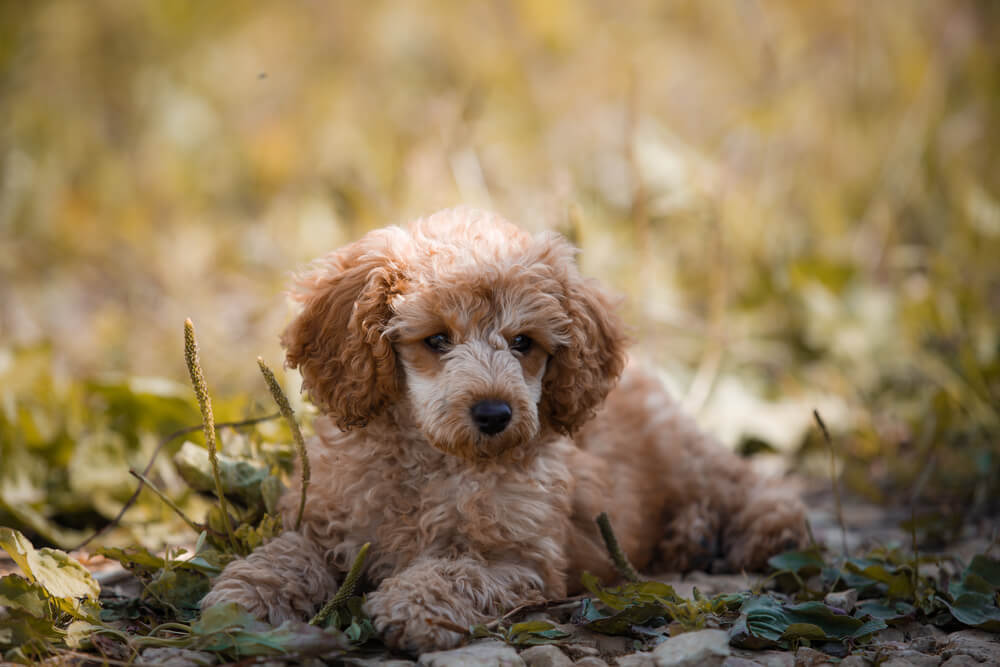
Do Toy Poodles Shed?
Yes, all dog breeds (and animals with hair, including humans) shed.
With that said, however, Toy Poodles don’t shed as much as other breeds, and since the have a curly hair, rather than falling to the floor, the hair that they shed gets trapped in their coat.
Additionally, it is because their hair is so dense and curly, and because they only have a single coat of hair (dogs with double coats shed more) that they shed very little.
Do Toy Poodles Have Fur or a Coat?
Like all varieties of Poodles, Toy Poodles have a single coat of hair.
Hair is much different than fur, as it has a longer growth cycle and it tends to grow longer. Hair also tends to be softer than fur. In the case of the Toy Poodle, however, as mentioned above, their hair is coarse, thick, and very curly.
Do Toy Poodles Have Dander?
Yes.
Again, all dog breeds produce dander. Pet dander is dry, flaky skin, similar to human dandruff. The dander contains a protein, and this protein is an irritant that causes allergic reactions in some people.
It’s important to note, however, that while Toy Poodles do have dander, they do not release as much dander as other breeds; moreover, because their hair is so thick and curly, the dander and spent hair gets trapped in their coat.
It is for these reasons that the Toy Poodle is considered a hypoallergenic dog.
How to Groom a Toy Poodle
Just like any dog breed – especially those that have long hair – Toy Poodles need to be regularly and properly groomed, not only to maintain their appearance, but more importantly, to maintain their health.
Here are some useful grooming tips that you can use to ensure that your Poodle is properly groomed.
Brushing
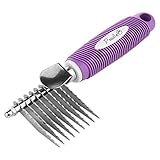
Because Toy Poodles have long, curly hair, it is prone to matting.
Matting will not only negatively affect the aesthetic appeal of your dog, but it can also pose serious issues, including health problems, such as skin infections. As such, it’s important to brush your Toy Poodle; however, brushing should only be done when it’s necessary, or at the time of clipping.
Make sure to use a high-quality brush, or a de-matting fur rake comb/brush (found on Amazon) would be even better, as it is specially designed to handle the thick, curly coat of a toy poodle.
Bathing

Bathe your Toy Poodle on a monthly basis, or whenever he becomes dirty or smelly.
Because Toy Poodles have sensitive skin and they are prone to allergies, it’s best to use a mild shampoo (available on Amazon) that contains quality, natural ingredients, such as natural oils, vitamins, extracts, and even oatmeal.
Trimming
To keep your Toy Poodle’s coat looking great and to prevent matting, trimming should be done on a regular basis. If you want to keep his hair short, have him shave at a dog groomer whenever needed.

There are several other kinds of styles that Toy Poodles can be cut into, such as the Teddy Bear style, the Lamb cut, or the Continental cut, which is the classic look that show dogs usually sport.
If you feel confident enough to do so yourself, trim your toy poodle with a high-quality pair of dog trimmers. If you do not feel confident in your abilities, have your Toy Poodle cut by a professional.
Ears
Toy Poodles have floppy years, and their long, curly hair can grow into them. As such, it’s important to clean your pooches’ ears on a weekly basis, so as to prevent dirt and debris buildup that can cause infections.
Use a clean cotton ball moistened with warm water, or apply an ear cleaner provided by your veterinarian, and gently wipe out the underside of his ears to remove any wax and debris buildup. It’s important to note that you should never stick anything directly inside your dog’s ears.
You should also make sure to trim the hair around your toy poodle’s ears to prevent hair from growing inward.
Nails

Like any dog breed, a Toy Poodle’s nails should be well-maintained.
Once or twice a month, or as needed, use a guillotine-style dog nail clipper or a dog nail file (buy on Amazon) to trim your dog’s nails.
Use care so as not to cut past the quick, the black vein in the center of the nails, which, if cut, can cause severe bleeding and pain. While you’re tending to your dog’s nails, make sure that you attend to his footpads, too. Trim the hair around and between the footpads.
Eyes
If you have a light colored Toy Poodle, be sure to wash around his eyes; otherwise, tear stains can develop. Use a clean, damp cloth, and a tear-free shampoo to clean around your dog’s eyes.
Do Toy Poodles Have Allergies?
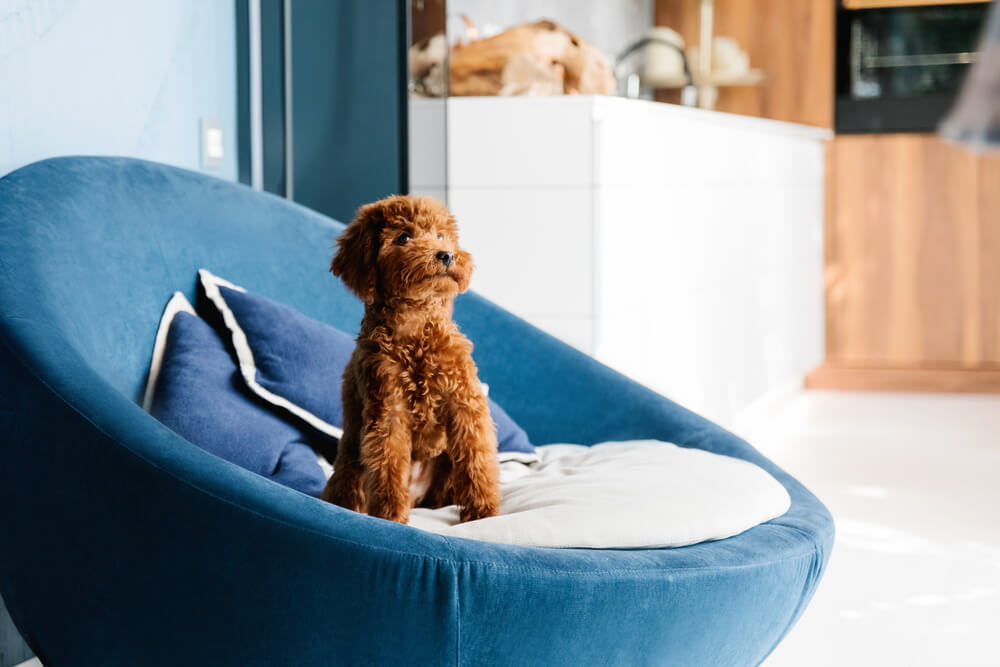
Yes.
While all varieties of poodles can be affected by allergies, Toy Poodles do seem to be more susceptible to allergic reactions than their larger counterparts, including the miniature and standard Poodle.
There are five different categories that can trigger allergies in a Toy Poodle, including:
The signs and symptoms of allergies in Toy Poodles vary and depend on the specific dog and the type of allergen they are sensitive to.
Allergic response can produce external symptoms, such as irritated eyes, ears, nose, and/or skin irritations, such as rashes or eczema.
Internal symptoms can occur, too, meaning that their the reaction causes internal side effects, such as digestive upset.
Remedies for Allergies in Toy Poodles
No matter the cause or the side effects, allergies can be very irritating and uncomfortable for your toy poodle. In serious cases, severe allergic reactions can occur. As such, whether you’re positive your dog suffers from allergies or you’re certain he does, combating them is imperative.
The following are some remedies that may be useful.
Contact Allergies
Washing with hypoallergenic, perfume-free laundry detergent, bathing with hypoallergenic products, ensuring that all soap is removed from his coat, and vitamin E and fish oil products that are rich in Omega fatty acids can help to prevent dry skin and inflammation.
Food Allergies
If your Toy Poodle has food allergies, feeding him a high-quality, single or minimal ingredient, all natural food would be ideal. Ollie Dog Food (50% off your first order) offers veterinarian designed single variety recipes that are made with proteins, such as lamb and turkey instead of beef and chicken, and are fortified with vitamins and minerals that support the immune system, and contain probiotics.
Flea Allergies
The saliva of a flea can prompt allergic reactions in some Toy Poodles after they’ve been bitten. To prevent this allergic response, you need to keep fleas at bay in the first place. There are several flea and tick products that can be applied topically, worn or orally ingested by dogs. There are also products that you can use throughout your home.
Fish Oil
You might want to give your Toy Poodle a high-quality fish oil, too. Fish oil supplements helps to prevent dull coat and scaling, and will nourish your toy poodle from the inside-out, ensuring that his coat remains lustrous, thick, and full.

